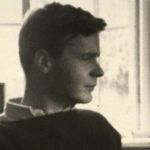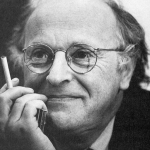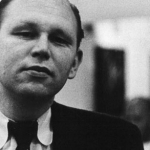I
I hear you are whispering there O stars of heaven,
O suns—O grass of graves. . .
If you do not say anything how can I say anything?
Let us tunnel
the air
(as a mole’s green galleries)
toward the ultimate
cornfield
—the square of gold, & green, & of tassle
that rustles back at us—
let us burrow in
to a susurration, the dense starlings,
of the real—
the huge
sunflowers waving back at us,
as we move
—the great grassy world
that surrounds us,
singing.
II
Unseen buds, infinite, hidden well,
Under the snow and ice, under the darkness,
in every square or cubic inch,
Germinal, exquisite, in delicate lace, microscopic. . .
Slant sheen/wrinkled silver.
Foxtail & lace-fly out of the vast organic slough
of the earth,
& the exquisite eye
—as myriad upon myriad of dandelions—
seeding itself on the air.
Poems beginning germinal in the instant
—reeling out, unravelling, tendril & silken, into the air—
ethereal growths,
sudden, & peculiar as mushrooms?
Uncrumpling
as moths from cocoons—
under the darkness,
pale wings,
slight densities out of the breadth of summer nights?
A largesse!
Argus-eyed & instant.
III
These I compass’d around by a thick cloud of spirits. . .
Solitary, smelling the earthy smell
. . . a handful of sage.
Here, out of my pocket—
twigs of maple & current-stems,
copious bunches of wild orange, chestnut, lilac!
. . .
But I have come O Walt
for the interchange, promised, of calamus,
masculine, sweet-smelling root,
between us:
you, who lie in Camden, still waiting for death,
still exuding an earthy smell
—your pockets redolent with sage—
the pond-soil still clinging to your fingers,
aromatic with plucking
calamus.
Calamus, ‘sweet flag’,
that still thrusts itself up,
that seasonally thrusts itself up for lovers.
IV
The press of my foot to the earth
springs a hundred affections,
They scorn the best I can do to relate them. . .
(The moth and the fish-eggs are in their place, The bright
suns I see and the dark suns I cannot see
are in their place. . .)
I see a galaxy of gnats,
close-knit, & whirling through the air,
apparently for the pure joy of the circle, the jocund
inter-twinement.
And through this seethe,
I see the trees,
the blue accumulations of the air
beyond,
perceived
as through a sieve—
& all, through other, & invisible, convolutions:
those galaxies in a head
close-packed & wheeling.
I am invovled with the palpable
as well
as that impalpable,
where I walk, mysteries catch at my heels
& cling
like cockle-burrs.
My affinities are infinite, & from moment to moment
I propagate new symmetries, new
hinges, new edges.
V
Earth, my likeness
. . .
I, too, have plucked a stalk of grass
from your ample prairie, Walt,
& have savored whole fields of a summer’s hay in it—
I have known your Appalachian length, the heights
of your Sierra
—I have unearthed the roots of calamus
you left at the margin
of many, hidden ponds,
& have exchanged it with the few, select,
lovers.
I have lain in the open night,
till my shoulders felt twin roots, & the tree of my sight
swayed,
among the stars.
I, too, have plucked a stalk of grass
from your ample prairie, Walt.
VI
Hefts of the moving world
at innocent gambols silently rising, freshly exuding,
Scooting obliquely high and low.
Dappled concave pulsing to the cricket’s scrape:
the scud & mottle of sudden
dilations, divigations & night-jars.
CHURR, CHURR.
Mackerel & Fleecy,
in alternate dusks &
brightnesses,
a restlessness tumbling its
meadows, yeasty,
churning,
its black & white heifers working the cosmic cud
—a moon-humped bulge, as of the sea, swelling, irresistibly—
CHURR, CHURR
I, too, caught in its strange tussle
its tough, prosy commas
punctuating the surge of me, out, & out,
lifting & proliferating: drifts
elastic, supple,
effuse.
VII
A trasparent base
shuddering. . .
under and through the universe
rides the brows of the sounding whales
& swells in the thousand
cow-bells.
It undulates under each meadow
to thunder in the hills, the crow’s call,
& the apple-falls.
I hear it always, in a huge & earthy fugue,
from inner ear, to farthest owls:
the circulatory music of all things, omnipresent & in flux.
VIII
This grass is dark
. . . to come from under the faint red roofs of mouths.
Dark as heat-lightening—
mirage of flesh!
—purifying the air electric.
The intimate kernel putting forth a final leaf
from The Valley Of The Many-Colored Grasses.
An Aurora Borealis
‘dawning’
incorporeal.
All day the figures continued to move
about
& to bend over the green mounds
in the warm air.
Shades limned exact in the prismatic spheres
of death.
O SPEARS! TRANSPARENCIES!
IX
Landscapes projected masculine,
full-sized and golden. . .
With floods of the yellow gold of the gorgeous, indolent,
sinking sun, burning, expanding the air.
But are these landscapes to be imagined,
or an actual
Kansas—the central, earthy, prosaic core of us?
Or is the seen always winged, as eidolon only to us—& never
the certain capture
of great, golden, unembroidered
slabs?
All is Oz.
The dusty cottonwoods, by the creek,
rustle an Emerald city.
And the mystic, immemorial city
is rooted in earth.
All is Oz & inextricable,
bound up in the unquenchable flames of double suns.
X
The smoke of my own breath,
Echoes, ripples,
buzz’d whispers, love-root, silk-thread,
crotch and vine.
I have put my ear close & close to these lips, heard them
to the last syllable
spun out—
respirations of an encircling night
—a cat-bird’s ventriloquil
‘whisper-song’
interspersing melodics with soft mews, brushing &
teasing my ears with its intimacies
as if surrounded
by many muted birds in the dark.
And ever these nights of ‘love-root’, sweet
calamus, embrace me, elusive, illusive, their buzz’d whisper
ever
at my ear.
Echoes, ripples.
There are Camerados, Walt—still they come.
And nights yet to come
to whisper you
to the ears of others.





















Comment form: